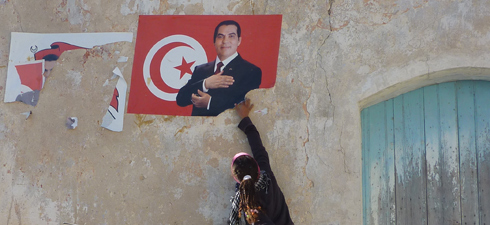The news was announced in the late morning of 17 January: the European Union (EU) was ready to offer Tunisia "immediate" aid for the holding of free and democratic elections — a fine gesture on the part of "good Europeans" that will warm the hearts of our Tunisian neighbours. They must be overjoyed to see Europe flying to the rescue after their victory over Ben Ali, even if only a few days earlier Brussels was still involved in highly compromising negotiations for an “advanced status” partnership with Ben Ali’s government. However, this opportunistic display of virtue is unlikely to erase the memory of the disturbing fact that Tunisia’s proximity to Europe had no impact on the longevity of the country’s authoritarian regime.
Among the Mediterranean Arab countries, Tunisia — and also Morocco — have a long history of close cooperation with Europe in the form of agreements with the EEC, and thereafter, with the EU. The first North African country to conclude a Euro-Mediterranean Association Agreement within the framework of the "Euro-Mediterranean partnership" (or "Barcelona process"), Tunisia notably benefited from extensive financial aid to help open up its economy to free trade. In 2004, when the newly enlarged EU launched its European Neighbourhood Policy, Tunisia was once again, along with Morocco, among the first countries to participate in the new framework for bilateral cooperation. On this basis, it was tied to Europe without any perspective of accession to the EU, but with no obligation for political reform, apart from compliance with a ‘slimmed down’ and à la carte version of the Copenhagen criteria: democracy, rule of law, human rights, respect for minorities and a market economy.
Autocratic leaders can look forward to tacit support
As a result, Ben Ali’s Tunisia came close to being a special 28th member of the EU without having to submit to the inconvenience of applying the Union’s political standards. Although the EU and Tunisia did agree that democracy, the rule of law and human rights should be "priority actions,” they were not burning issues but simply entries in a list of a dozen or so chapter titles, which also included the “fight against terrorism”, free trade, direct foreign investment and "the efficient management of migration flows". The action undertaken to raise the standard of democracy was limited to administrative and judicial reforms and the drive to ensure that Tunisian legislation complied with international agreements.
The ambiguity of the situation, which was deplored as scandalous by a number of MEPs, required some fancy footwork on the part of the EU. Brussels had a commitment to promote democracy in the Mediterranean region, but this was set aside in the drive to make progress on issues linked to political Islamism, terrorism and the pressure of Sub-Saharan migration for which the Maghreb was a transit zone. The broad range of initiatives in these fields reflects the existence of an international culture of surveillance, which allows authoritarian governments trade favours with democracies. Autocratic leaders can look forward to tacit support that contributes to the sustainability of their regimes in exchange for cooperation on security.
Ben Ali’s regime was a prime example of the type of authoritarian domination that has been banished from the polite world of European democracies. And when they rose up against it, the Tunisian people had no one to count on but themselves. There was no external support from fainthearted Europe, and not a word from the French government, which was complicit to the point of providing police training. The only country to speak out was the United States, which repeatedly issued warnings about the bloody response to the revolt.
"An involuntary arrangement for the rearing of tyrants"
Tunisia has now entered a phase of political transition with no fixed rules and no certain outcome. The dismantling of the authoritarian system and the realisation of democratic aspirations will remain an internal matter for Tunisians. As it stands, European demonstrations of support for this difficult and perilous enterprise are limited to offers to provide aid, and aid for the holding of elections is the most radical gesture we have seen so far.
In this context, it is clear that Europe should rethink its neighbourhood policy with Mediterranean third countries, and learn from the recent events in Tunisia that have sent a shock wave through a region which until now has been treated as a bulwark for European democratic space. But confinement in Europe’s fortifications will not bring democracy to either Tunisia or its neighbours. "The democratising of Europe, wrote Nietzsche, “is at the same time an involuntary arrangement for the rearing of tyrants." Perhaps we should adapt this formula, which is so pertinent to our role as “good Europeans" and our relations with the southern shores of the Mediterranean, to suit our era and our democratic convictions.
Translated from the French by Mark McGovern
Diplomacy
Aid and sanctions envisaged
The Political and Security Committee (PSC), a European Council body that deals with crisis situations and the possible EU responses to them, is scheduled to meet 21 January to discuss the aid that the EU should provide to Tunisia: humanitarian aid, support for political reform and economic development, and financial sanctions – as well as formalising the freezing of assets and titles acquired abroad by the former Tunisian president Ben Ali and his entourage decided on 20 January by a committee of experts of the EU27. It will then be up to member states' foreign ministers to make the political decision to implement the measures chosen. Although no position has yet been arrived at, the decision to freeze the assets of Ben Ali and his entourage seems to be the consensus, writes Les Echos.
Do you like our work?
Help multilingual European journalism to thrive, without ads or paywalls. Your one-off or regular support will keep our newsroom independent. Thank you!
















